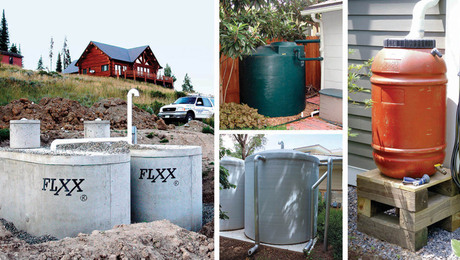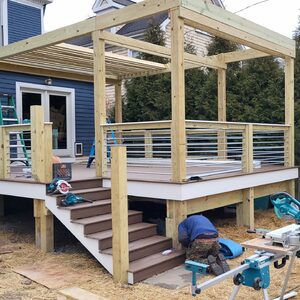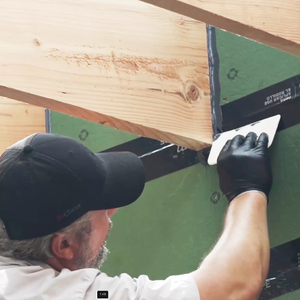I’m in a unique situation. Building a new home north of Boston. There is gas on the street but my dilemma is that the street was just paved and therefore the town has implemented a 5 year moratorium on disturbing the pavement. I plan on heating the home with a furnace and central air for cooling. anybody have any idea if it is worth it to put a propane tank in the yard for the 5 years and then make the simple conversion to natural gas. My other option is to stay with oil but I’m told if I’m heating and cooling with air the gas is a much better setup. Any ideas? anybody know of the installation costs of an oil system vs a propane system?
Discussion Forum
Discussion Forum
Up Next
Video Shorts
Featured Story

There's a constant source of clean water for you to use, and all you have to do is collect it.
Featured Video
How to Install Exterior Window TrimHighlights
"I have learned so much thanks to the searchable articles on the FHB website. I can confidently say that I expect to be a life-long subscriber." - M.K.

















Replies
We replaced our oil furnace with propane about 3 years ago, a crack in the fire chamber and leak in the oil tank forced our hand. We went with propane for a variety of reasons; we use it to heat (FHA), hot water tank, dryer and cooking - including a connection on the patio for the grill. If we ever decided to add central air we could run it off of propane - ditto for a generator, too. Nice to have one fuel for all of these.
Just this past winter I replaced the oil furnace & tank in a duplex I own, stayed with oil mainly because we already had the prepay account with oil company for the duplex and they do the 24hr service, etc. Didn't want to have the oil company service one side and a propane company service the other.
Overall, removal of the old systems and installation costs of the new - including tanks - was pretty similar. But having used propane for a while now I will say that it's cleaner, no smells in the basement, no chimney isses to deal with (propane, like natural gas, can be direct vented thru the side of the house with the proper equipment), and there's minimal annual maintenance in comparison to oil, no filters to clog or change, no nozzles to clog or change...just seems easier and less problematic.
I'm sure there's difference's in BTU's and everyone will have their favorite fuel, but I'm not going back.
Also, you may want to check with the gas and propane companies in MA. When I lived there a few years ago it seemed they always had a great deal on equipment if you went with their fuel. I switched from oil to gas and the gas company (NStar? I think) did the whole removal and conversion for almost free.
-Norm
. The propane tank is 500 gallons and is buried in the yard, just a conning tower sticking up. A 175 gallon (or 2 of them daisy-chained together was an option but we didn't want to see the tanks.). The oil tank is of course in the basement.
"The propane tank is 500 gallons and is buried in the yard, just a conning tower sticking up. A 175 gallon (or 2 of them daisy-chained together was an option but we didn't want to see the tanks.). The oil tank is of course in the basement."What were the requirements for burying it in the yard?
In some (cold) parts of the country the tank pretty much has to be buried to keep the propane warm enough. In other (wet) parts of the country it isn't allowed to bury the tank -- too likely to resurface in wet weather.
If Tyranny and Oppression come to this land, it will be in the guise of fighting a foreign enemy. --James Madison
If Tyranny and Oppression come to this land, it will be in the guise of fighting a foreign enemy. --James Madison
It is called lining the pockets of the rich by allowing them to produce goods outside the country with no restrictions.
Not only do I not know what that has to do with propane, I'm not even sure what it means.
If Tyranny and Oppression come to this land, it will be in the guise of fighting a foreign enemy. --James Madison
They have not exported propane, yet. But they have exported everthing else except American labor and we are buying our resources back at quite a high price.
I got lost on that one too.
Welcome to the Taunton University of Knowledge FHB Campus at Breaktime. where ... Excellence is its own reward!
"What were the requirements for burying it in the yard?"
It was a 500 gallon tank, so the hole had to be just big enough for it to fit with 6-8" of sand on the bottom. Then backfilled but being carefull not to push any big stones into the hole.
The high pressure line from the tank to the house had to be 24" deep, regular copper line to the barn (shorter run) was 18" deep. Both lines had to be on a bed of sand 3-4" thick and then covered with 3-4". Had to be sure no large (grapefruit size or bigger) stones filled into the trench on top of the lines.
I sub'd out the tank hole and trenching, did the backfilling myself. LP companies self-inspect the work up here. No town or state employees verify any part of it.
-Norm
I was wondering about the tank rusting over time and if there was anything you did to prevent the possible occurence of that.
Any buried metal tank should have a sacrificial anode connected to it.
If Tyranny and Oppression come to this land, it will be in the guise of fighting a foreign enemy. --James Madison
what DanH said - there was a sacrificial anode attached. LP company said it should last ~20 years.
-Norm
VtNorm, thanks so much for your time and ideas. I think I'm leaning towards propane after the points you made.
Consider this first.In some areas, Propane is as much as 2-1/2 times the cost of oil per BTU, and is definitely more expensive than nat gas.but look to the future. Remember that supply and demand effect the price at your end of things. There is a steadily rising demand for propane in this country, but there are pressently no new plants being built to process the nat gas into the bottled version. Nobody wants one in their back yard. The price of propane will thus rise faster than the price of natrual gas.
Welcome to the Taunton University of Knowledge FHB Campus at Breaktime. where ... Excellence is its own reward!
You'll need to compare the cost per BTU in your area. Gas has been swinging in price almost as much as oil
Welcome to the
Taunton University of Knowledge FHB Campus at Breaktime.
where ...
Excellence is its own reward!
Yeah, if you were going to use hot water heat, or weren't reasonably sure you'd eventually be able to hook up to natural gas, the situation would be different, but in your situation it's probably wisest (cheapest in the long-run) to go with propane and a high-efficiency, direct-vent furnace. Certainly in terms of reliability and maintenance you'll be better off.
Just be sure to inquire about the conversion costs you'll face when the time comes, and make sure any code requirements (piping, etc) for NG are satisfied.
One problem you may have is that propane water heaters aren't always convertable to NG, so double-check that situation -- maybe pay a little more for a convertable unit.
DanH, Thanks for your time and ideas. Good point about checking into the conversion cost if I choose to go to NG some day. Much appreciated
"There is gas on the street but my dilemma is that the street was just paved and therefore the town has implemented a 5 year moratorium on disturbing the pavement."
Is the gas main under the pavement in the middle of the street, or on the other side of the road? The reason I ask is that I've watched the gas company 'push' a pipe from one side of the road to the other without disturbing the road above. Maybe this is is an option that you might look into. The extra installation cost would be offset by not having to to do it twice, and the piece of mind knowing you won't run out of fuel in the middle of a cold snap.
They dig a big hole on both sides of the road. Get the gas pipe with a cap on the end and then use the backhoe/excavator to push the pipe through the soil. Once through the cap comes off and they make the connections. With the plastic pipes used now, they might be using the pipe as a conduit for the gas line. But I can't say for sure since I haven't seen it close up.
On wider streets they are now using horizontal drilling rigs to do the same thing.
QCinspector, Thanks so much for your time. Unfortunately the line is under the pavement about 5 feet off my curb. The gas company says they can get at it from my yard as they support the pavement above but the town says no way. It seems they've had sink holes in the past due to this practice. Good idea though
I'm on the Inspectors team. Don't know about Mass., but in Pa. ALL available utilities MUST be made available to ALL TAXPAYERS. "Taxpayer" being the key word here. I hope you tried fighting this and didn't just accept their BS.
Years ago when building a house, the local township tried something similar with the water line...they wanted me to pay for the understreet boring. $200 to a local lawyer got it straight.
Ditch.. good idea I never thought about it that way. I'll look into that
No one mentioned the fact that you can shop for the best price and service with oil or LP.
When your on the street they own you.
I just finished our home in Northern Maine and chose LP. It's running the gen set, cook top, and heat/hot water. Stayed with electric for the oven (wall) and dryer.
I think it depends on your location. I'm facing a decision like this in the future. Friends of mine who have LP (Northern Westchester
Putnam Counties, NY) say that initially they had shopping options, but the LP companies structure things so that you are locked into one company and then really gouged them on price.Anthony
_____________________________________
"Never try to teach a pig to sing. It only wastes your time and annoys the pig."
I converted the heating system in my old farmhouse from oil to propane two years ago. I stayed with hot water radiators--we simply pulled the old oil burner and replaced it with a really efficient Munchkin modulating/condensing propane unit. It also heats our domestic hot water. Yes, propane has significantly fewer BTU's per gallon than oil, but the efficiency I picked up meant I am buying the same gallons of fuel--now it's propane instead of oil. No more smells in the house, no more service calls.
In this area (OH), oil has been much more expensive than propane lately. And, we have better competition among propane dealers.
Other benefits of propane: we use it for stove and BBQ cooking.
Oil is nasty, smelly stuff. I was really glad to get that stuff out of my basement.
Marc
We have oil heat and have looked to converting to gas. It would require a whole new furnace, so we didn't go that route.
The only time we have any smell is when they fill the tank (which is in the basement). The fumes persist for a few minutes and that's it.
But I'm not trying to sell you on oil heat. If I were in your position, I'd get a lawyer and fight city hall. Can't access utilities when building a house? Easements granted for utility companies? I'd press the issue. They took your money for a permit, didn't they?
I had propane for the last 7 years & went with oil for my new house for the following reasons: (no flames please I know there are tradeoffs)
Price per BTU (we have a gas stove - propane prices are killing me)
Cost of appliance - Bock water heater/radiant heat in my case
I could install it myself
Saved $2K on the tank vs a propane tank
If I run out on a weekend (it happens) I can refill myself
I'm not a slave to the strange contract agreements our local propane companies run (and I even owned my propane tank)
We use offroad diesel/heating fuel for everything else out here, its convenient and i can buy a lot when its cheap
BUT I need a yearly tune-up, there could be a smell (none yet & the mechanical room is separated from the basement - I could add a door if needed)
just my 2 cents...
I keep thinking about the " 5 year no digging " thing. I can understand the intention,,, but come on!!!
You need a " gas leak " right in front of your house. When they make the repair, they can hook you up.
H